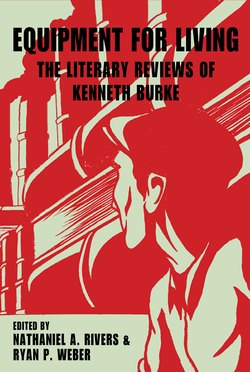Читать книгу Equipment for Living - Kenneth Burke - Страница 12
На сайте Литреса книга снята с продажи.
ОглавлениеThe Hope in Tragedy
Chorus for Survival by Horace Gregory. Covici, Friede
Poetry, July 1935, 227–230
When we consider the great proportion of urban material embodied in Gregory’s work, it may seem perverse of a critic to call the basic patterns of this poet’s mind agrarian. Yet there is a sense in which the adjective applies almost as well to him as to the writer whose work seems to have had most effect in shaping him, D. H. Lawrence (a master whose significant vices Gregory has avoided with phenomenal tact). By an agrarian pattern of mind I mean a marked sense of periodic recurrence, of seasonal repetitions—observation largely shaped by the feeling that what has been still is and will be. In the typical urban attitude, history is a straight line, moving ever onward, leaving old things behind it, and coming into regions wholly new. It is “progressive,” whereas the agrarian attitude is cyclical.
Motivated by the mystery of the seed, with its confluence of past, present, and future (life as born of death), the agrarian pattern is in essence tragic. Its concern with problems of rebirth makes for many variants of the Phoenix symbol. And we may expect to find here, in one guise or another, the vision of a marmorean Atlantis that lies, still perfect, its palaces intact, its marbles posturing in heavy twilight, at the bottom of the sea.
The agrarian pattern is that of the “Eternal Now.” It brings the past to us, not as of antiquarian interest, as a collection of curios in a museum, but as another version of the present. The events of today, however concretely noted (and Gregory can note them as concretely as does any barrister’s indictment before a Grand Jury) are at the same time fused with a sense of long perspective, whereby the poet is close-to and remote-from simultaneously. In his case, a specific intimate event, existing in its particularities but once, is reported with an overtone of migrations and historic sweeps. The poet observes through a screen of myth, so that what he sees bears the markings of this screen upon it. (The result is not “illusion,” since the sense of relationship embodied in the myth is as “real” as anything else in the universe.) Thus, Gregory is realistic and visionary at once, noting accurately, almost photographically, while his “metaphysical head” remembers that the ocean’s roll and the expanse of continents lie significantly about the fringes of his details. Historic telescoping comes natural to him:
New York closed into Rome, Rome into Egypt, Cosmopolis, and only darkness there.
Having called him tragic, we might define our meaning further by distinguishing between the tragic and the hygienic. The hygienic would solve all problems by sterilization. Is one beset? Locate the germ, and kill it. The tragic attitude, based upon the mysteries of the seed, of life-from-death, cannot accept the methods of hygiene as a solution for our fundamental ills. Within the frame of the tragic attitude, we do not seek to sterilize our aberrations, but to harness them, to make them serve, and with the help of criticism to build assets out of liabilities. It would sluice the demonic lightning into wires; it would control by reins.
For such reasons, Gregory’s poetry is not always accepted by his political allies as assisting their immediate purposes. At first glance, the tragic attitude can appear to make for an acceptance of institutional maladjustments whereby the investor should “resign himself” in the most approved classic manner, to the burden of clipping coupons, and the impoverished, who cannot share the prosperity, are advised at least to attempt sharing the good taste (the Humanists’ irritating philosophy of decorum). But only the most superficial reading of Gregory can lead one to assume that his basically non-hygienic attitude is reactionary in implication. There are many forms of “resignation”; we may also “resign ourselves” to protest—and appeal to the tragic attitude would be woefully misused if it were taken to justify acceptance of a toothache where there is a dental surgeon handy.
To read Gregory’s three books of verse in succession is to note a gradual enlargement of his rhythms, which began with a sharpness sometimes almost hectic, and have slowly expanded to attain something like the gravity of rivers. Such progress in maturing, such grip upon the sustaining of his musicality, would indicate that he is at peace with his methods. The long invocation, Tell us that love returns, establishes a mood which he proves himself well equipped to maintain. And the ballad-like Through streets where crooked Wicklow flows is a terrifying picture of poverty done with the fullest poetic skill. I shall be surprised if it does not earn recognition as a poem exemplifying in the noblest manner the issues now upon us.
